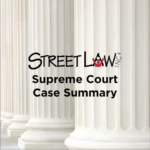One of our oldest human rights, habeas corpus safeguards individual freedom by preventing unlawful or arbitrary imprisonment. This documentary examines habeas corpus and the separation of powers in the aftermath of the 9/11 attacks as the Supreme Court tried to strike a balance between the president’s duty to protect the nation and the constitutional protection of civil liberties in four major Guantanamo Bay cases: Hamdi v. Rumsfeld, Rasul v. Bush, Hamdan v. Rumsfeld and Boumediene v. Bush.
Closed captions available in English and Spanish.
Major Events of the Cold War
In this lesson, students will use short video clips to learn about major events occurring during the Cold War, the causes of these events, and their impact on the U.S., Soviet Union, and the world. Students will summarize this information by providing a written response that analyzes the legacy of the Cold War.
Boumediene v. Bush (2008)
Do detainees at Guantanamo Bay have the constitutional right to challenge the legality of their confinement using a writ of habeas corpus? This case summary shows how the Supreme Court answered that question in 2008.
